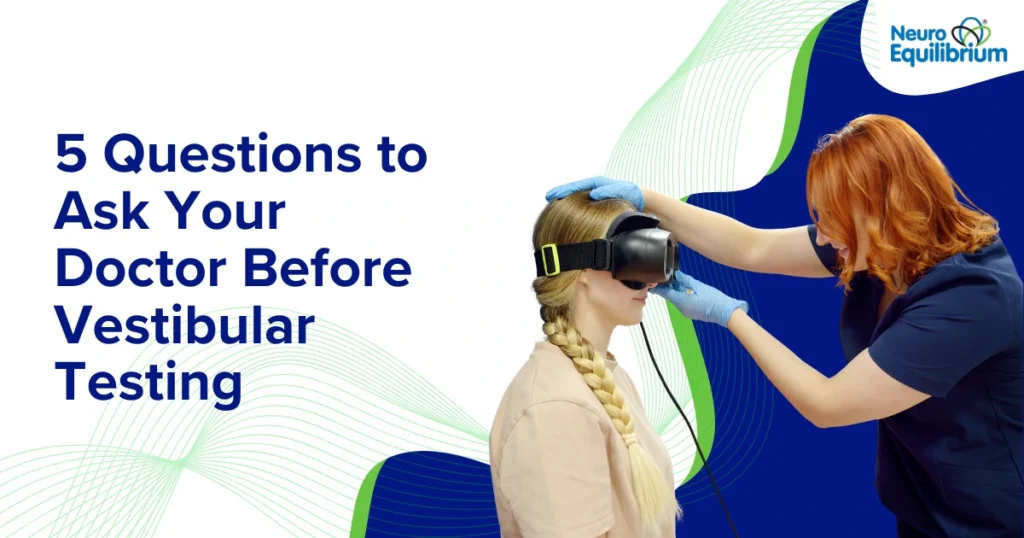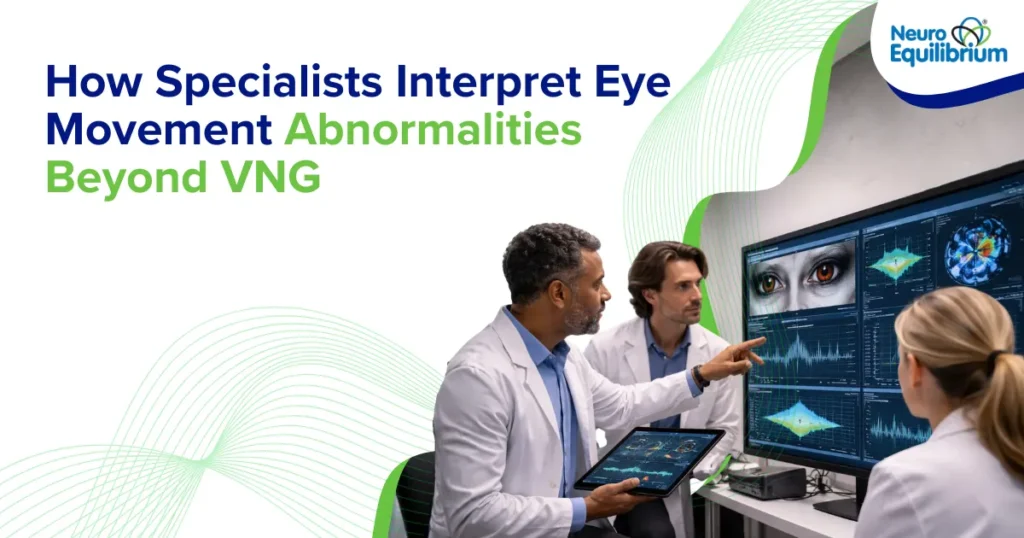A balance test is an essential procedure that your medical practitioner may recommend if you’re experiencing vertigo or you have a feeling of dizziness, specifically if it seems like the room is spinning. This group of tests focuses on the inner ear and tests for any problems that may be causing balance or steadiness problems.
The details about the required tests might seem a bit overwhelming at first, but there’s no need to worry! Understanding these specific tests and their importance can really help make the process feel less stressful for you. Knowing what to expect can definitely ease any fears and support you.
Clinics like NeuroEquilibrium provide state-of-the-art vestibular testing with expert care, ensuring that you’re in good hands.
Know More About Vestibular
- How Vertigo Exercises Help Cure Vestibular Disorders?
- Balance Rehabilitation: Exercises and Therapy Techniques
- How Yoga And Tai Chi Help Balance Issues?
The 5 Questions to Ask Your Doctor
Question 1: What is the specific reason you are recommending this vestibular testing?
Dizziness and unsteadiness are symptoms that are linked to several medical conditions. For example, disorders of the inner ear such as benign paroxysmal positional vertigo, Meniere’s disease, and vestibular neuritis are quite common, as are conditions of the brain like vestibular migraines and acoustic neuromas.
Since there are many potential causes, doctors perform several different kinds of vestibular tests to determine the root of the problem. These different balance system evaluations benefit the doctors by giving them an overall idea of your situation.
Getting to know what your doctor intends to learn from these tests can really help clarify the purpose of the testing and the possible reasons for your dizziness, making the treatment process smoother. At NeuroEquilibrium clinics, we focus on more than just a general evaluation; we use advanced equipment to accurately diagnose you based on your specific symptoms.
Question 2: Can you explain which specific vestibular tests will be performed and what each test involves?
Your doctor will perform several vestibular tests in order to determine the functioning of your balance system. Some of the most frequently performed or conducted tests include:
Videonystagmography (VNG) and Video Head Impulse Test (vHIT). They use cameras that detect heat and watch how your eyes move when you try to look in a particular direction or when you attempt to move your head in a certain way. The vHIT test is part of the vestibular evoked myogenic test and aims to investigate how the inner ear signals respond when your head is moved rapidly.
Dynamic Visual Acuity and Subjective Visual Vertical are two distinct tests used to assess the relationship between vision and balance. Posturography helps clinicians evaluate a person’s body stability while standing. Additionally, VEMP (Vestibular Evoked Myogenic Potentials) measures the response of specific balance-related muscles to sound and changes in position.
These various tests provide a range of detailed options for diagnosing your balance system, as they work together to clarify the symptoms. At NeuroEquilibrium, we utilize tools like VNG with infrared cameras to carry out these tests, allowing us to obtain precise results. This information empowers doctors to create the best treatment plan for each patient.
Question 3: Do I need to make any specific preparations before the vestibular testing?
Your vestibular tests involve a few simple steps that help ensure accurate results for your doctors to assess your health effectively. It’s important to follow any specific instructions from your doctor, which may include avoiding certain medications, and alcohol, before the test. This is because these substances can affect how your balance system works. In some cases, you may be asked to refrain from eating or drinking for a few hours prior to your appointment.
Rest assured, doctors and technicians will provide clear, step-by-step guidance on what to do before and during the test, and it’s really important to follow those instructions. By following the medical instructions, your doctor will have a better understanding of your condition, allowing them to provide the best possible treatment for you.
Question 4: What can I expect to experience during vestibular testing? Will it be uncomfortable or trigger my symptoms?
In your vestibular assessment you will be told the way you are supposed to move your head and body. Some dizziness and spinning is common with certain movements particularly in cases of BPPV. Even though, perhaps, you may feel a little bit uncomfortable and dizzy for a while during these tests, keep in mind that such reactions are essential for helping doctors diagnose your condition better and these symptoms will settle with few seconds or minutes
During the testing process, you’ll be wearing special goggles, to record your eye movements, which are a major part of your balance system. The specialists and doctors conducting such tests are rigorously trained to make sure that you are not only safe but comfortable throughout the process. At NeuroEquilibrium, you’ll discover masters experts who are armed with state-of-art tools and techniques to provide gentle and supportive guidance in every step of your testing process.
Question 5: How will the results of the vestibular testing be interpreted, and what are the potential next steps based on the findings?
The main goal of vestibular testing is to uncover the reasons behind dizziness and balance issues. The results of these tests will help your doctor pinpoint whether you’re dealing with BPPV, Meniere’s disease, vestibular migraine, or any other concerns. With these evaluation results, your doctor can choose the treatment that’s just right for you.
Once your medical tests are complete, your treatment plan may include Epley-type repositioning maneuvers for BPPV, along with vestibular rehabilitation therapy and medication if your dizziness is related to migraines or Meniere’s disease. If your current tests suggest a more serious condition, your doctor may recommend additional tests or connect you with a specialist who can help.
At NeuroEquilibrium, we offer clear explanations of your test results and create a personalized treatment plan to outline what you can expect. Understanding your test results empowers you, giving you the confidence to take the right steps for improved well-being.
Conclusion
Getting the right questions answered before your vestibular testing can really boost your comfort level and help you prepare for the test. Understanding what to expect from the test, its purposes, and how the results guide your treatment not only eases anxiety but also empowers you to be an active participant in your care. Your journey to recovery relies on having a clear understanding of your vertigo condition and balance issues, along with the management steps you plan to take.
NeuroEquilibrium clinics offer expert diagnosis and specialized care designed to help you regain your balance and feel steady again. Book an appointment now.
Sources
- Strupp M., et al. (2020). Vestibular Disorders: Diagnosis, New Classification and Treatment Prospects. PMC. https://pmc.ncbi.nlm.nih.gov/articles/PMC7297064/
- Renga V., et al. (2019). Clinical Evaluation of Vestibular Dysfunction. PMC. https://pmc.ncbi.nlm.nih.gov/articles/PMC6377969/
- Stanton M., et al. (2023). Vertigo in Clinical Practice: Evidence-Based Diagnosis and Management. NCBI Bookshelf. https://www.ncbi.nlm.nih.gov/books/NBK482356/
- “What Is Vestibular Testing & How Is It Done?” (2024). Sahasra ENT (blog). https://sahasraent.com/2024/08/05/what-is-vestibular-testing-how-is-it-done/
- “Vestibular Testing,” Apollo Hospitals (diagnostics overview). https://www.apollohospitals.com/diagnostics-investigations/vestibular-testing
- “Balance Tests (Vestibular & Inner Ear).” MedlinePlus. https://medlineplus.gov/lab-tests/balance-tests/
- “Videonystagmography (VNG) — What to Expect.” MedlinePlus. https://medlineplus.gov/lab-tests/videonystagmography-vng/
- “Vestibular Function Tests.” Dr Shaun Watson — Audiology & Balance Clinic overview. https://www.drshaunwatson.com.au/vestibular-function-tests
- “Dizziness: Approach to Evaluation and Management.” American Academy of Family Physicians (AAFP). https://www.aafp.org/pubs/afp/issues/2017/0201/p154.html/1000
- “What Tests Can Be Done for Balance Problems?” ENT Specialists AK (overview). https://www.entspecialistsak.com/tinnitus-articles/tests-for-balance-issues/
- Meniere disease—deciphering vestibular tests https://pubmed.ncbi.nlm.nih.gov/38223348
- Interobserver agreement using eye recordings https://pubmed.ncbi.nlm.nih.gov/40820099
FAQs: 5 Questions to Ask Your Doctor Before Vestibular Testing
What is vestibular testing and why might I need it?
The inner ear balance system assessment utilizes specialized tests known as vestibular testing. Your doctor might advise these tests when dizziness and unsteadiness along with vertigo exist because they help determine if an inner ear problem or a brain-related disorder triggers these symptoms.
Book a consultation at your nearest NeuroEquilibrium Clinic today.
What types of vestibular tests are typically performed?
The five common vestibular tests used for diagnosis include Videonystagmography (VNG), Video Head Impulse Test (vHIT) and Dynamic Visual Acuity (DVA) alongside Posturography and Vestibular Evoked Myogenic Potentials (VEMP). The multiple tests evaluate different aspects of your balance system in order to create a complete picture of your medical condition.
Book a consultation at your nearest NeuroEquilibrium Clinic today.
Do I need to prepare in any special way before my vestibular testing?
Your doctor might require you to abstain from caffeine and alcohol together with some medications and to skip food consumption before the test for obtaining precise test results. The clinic will give you straightforward guidance about how to prepare adequately.
Book a consultation at your nearest NeuroEquilibrium Clinic today.
Will vestibular testing be uncomfortable or make me feel dizzy?
The testing process can sometimes activate brief moments of dizziness together with minor discomfort although these normal reactions help doctors learn about your symptoms. The testing procedures at NeuroEquilibrium clinics prioritize both patient comfort and safety during the entire process.
Book a consultation at your nearest NeuroEquilibrium Clinic today.
What happens after vestibular testing? How are the results used?
The doctor uses your test results to determine the underlying source behind your symptoms. Through their investigation the doctor will develop a treatment strategy that could consist of either physical movements or rehabilitation methods as well as medicine alongside potential consulting with expert professionals.
Book a consultation at your nearest NeuroEquilibrium Clinic today.
















